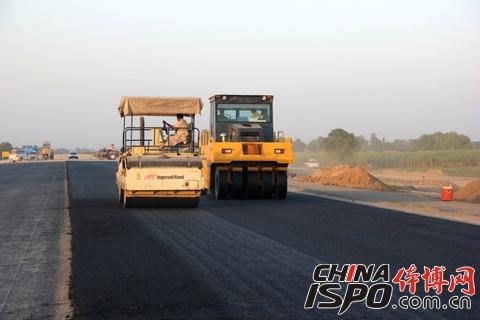How to master the virtual thickness of asphalt concrete paving
When asphalt concrete is paving, the key is to control the thickness of the paving, also known as the loosening coefficient. The loose paving factor is not well mastered. The compacted asphalt concrete will have problems with the thin thickness, affecting the quality of the project and directly affecting the project cost and project plan. The loosening coefficient of asphalt concrete should be different according to the actual type of asphalt mixture, construction machinery and construction technology. Generally, it can be determined according to the practical experience of operation, and the following values ​​can also be used. See the table below.

Asphalt mixture loosening coefficient
Mix type | Mechanical paving | Artificial paving |
Asphalt concrete mixture | 1.15~1.35 | 1.25~1.45 |
Asphalt gravel mix | 1.15~1.30 | 1.20~1.40 |
II. How to master the temperature of asphalt concrete during operation
The asphalt concrete used for the grass-roots level is processed through the thermal processing of coarse aggregates, and after thermal processing of asphalt, it is heat-mixed. Therefore, the transportation process, paving, and roller compaction are all required for thermal operations. Each process should be strictly controlled. Operating temperature, high or low temperature, will affect the quality of the project, and even bring the consequences of rework.
This hot mix asphalt mixture, in addition to the material itself requires processing, the external temperature should also be considered, there are different requirements for different types of asphalt. A list of temperature and temperature control requirements for different asphalts and processes is available. See the table below.
Working temperature of hot mix asphalt mixture
Asphalt type | Oil types | ||||
Asphalt marking | AH-50 AH-70 AH-90 A-60 | AH-110 AH-130 A-100 A-140 A-180 | A-200 | ||
Asphalt heating temperature (°C) | 150~170 | 140~160 | 130~150 | ||
Mineral material temperature | Gap type mixing machine | 10~20°C higher than asphalt heating temperature (filler does not heat) | |||
Continuous mixer | 5~10°C higher than asphalt heating temperature (filler heating) | ||||
Asphalt mix factory normal temperature (°C) | 140~160 | 125~160 | 120~150 | ||
Mixer storage storage temperature (°C) | The temperature during storage is reduced by no more than 10 | ||||
Transport to site temperature (°C) | 130~150 Winter ≥150 | ||||
Paving temperature (°C) | Normal construction Low temperature construction | Not less than 110~130 and no more than 165 Not less than 120~140 and no more than 175 | |||
Rolling temperature (°C) | Normal construction Low temperature construction | 110~140 and no less than 110 120~150 and no less than 110 | |||
Rolling end temperature (°C) | Steel roller Tire roller Vibratory roller | Not less than 70 Not less than 80 Not less than 65 | |||
Note: 1. The construction temperature is related to the type and number of the asphalt. The construction temperature of the thicker asphalt should be close to the high limit and the temperature of the dilute asphalt can be close to the lower limit.
2. When the asphalt mixture leaving factory temperature exceeds the high limit of normal temperature of 30 °C, the mixture shall be disposed of in sequence;